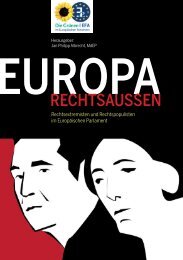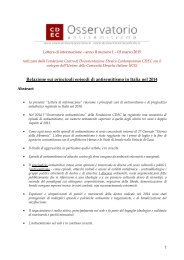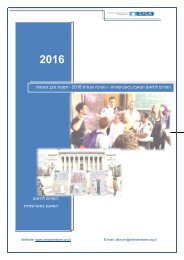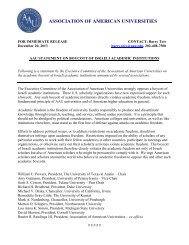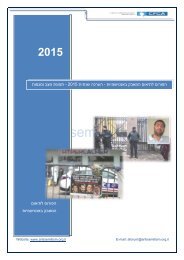692bf7d7d186ed633956d19255d3cf0b
Create successful ePaper yourself
Turn your PDF publications into a flip-book with our unique Google optimized e-Paper software.
formed in 1967 but remained very much<br />
at the margins. For example, the British<br />
National Party won 9.1% of the vote in<br />
the constituency of Southall in the west<br />
of London in1964. The NF was mainly<br />
successful in the 1970s on issues relating<br />
to immigration and won up to 16%<br />
of the vote in individual wards in local<br />
elections. It continues to demand the<br />
(if necessary, forcible) repatriation of<br />
immigrants from Great Britain. Due to<br />
the party’s lack of success in the parliamentary<br />
elections of 1979, open internal<br />
disagreements broke out, eventually<br />
leading to the departure in 1980<br />
of John Tyndall, who had been leader<br />
of the party since 1976 (and previously<br />
in the period 1972-74). Tyndall had at<br />
the time already been convicted several<br />
times, including in 1962 for having<br />
founded a paramilitary group. Since the<br />
1990s, the NF has been fighting with a<br />
small and outdated membership, failing<br />
to achieve any electoral success. 65<br />
In 1982, parts of the NF membership<br />
founded the current British National<br />
Party (BNP), again under the leadership<br />
of John Tyndall. However, in the 1980s<br />
the governing Conservative Party under<br />
Margaret Thatcher understood the need<br />
to address some of the issues of the<br />
right-wing extremists. Internal wrangling<br />
prevented any further major successes<br />
in the political debate.<br />
In October 1990, the EP Commission<br />
on Racism and Xenophobia (today the<br />
EUMC) observed that the BNP was<br />
an: “openly Nazi party ... whose leadership<br />
have serious criminal convictions”.<br />
In reply to the question whether<br />
the BNP was a racist party, Richard Edmonds,<br />
deputy leader up to the end of<br />
the 1990s, stated that: “We are 100 per<br />
cent racist, yes.” 66 Nick Griffin (member<br />
of the NF up to 1989, and member<br />
of the BNP since 1995) took over the<br />
BNP leadership from Tyndall in 1999.<br />
The latter had increasingly come under<br />
criticism in the 1990s because of failure<br />
to build on the party’s initial minor<br />
electoral successes. After his election<br />
to party leader, Griffin tried visibly to<br />
change the party’s image, doing away<br />
with the image of a Nazi party and aggressive<br />
behaviour at public marches. 67<br />
He hoped in this way to be able to address<br />
a broader electorate, even though<br />
he personally remained closely linked to<br />
the far right. Above all, the BNP blames<br />
non-white immigrants for the lack of jobs<br />
and general social problems. When, on<br />
26 May 2001, ethnic tensions in Oldham/Greater<br />
Manchester spilt over into<br />
violent confrontations between white<br />
and Asian youngsters, the BNP ranted<br />
against “Muslim gangs”. Shortly after,<br />
the BNP achieved its best-ever result in<br />
parliamentary elections, taking 3.9% of<br />
the vote. In Oldham, Griffin was able to<br />
win 16.4% of the vote. In Burnley, where<br />
there had also been violent confrontations,<br />
the BNP benefited with 11.3% of<br />
the vote. Despite the change of image<br />
under Griffin, the BNP clearly continues<br />
to belong to the fascist tradition. Until<br />
a change was forced by a court ruling<br />
at the beginning of 2010, party membership<br />
was reserved exclusively for<br />
whites.<br />
In the last general election on 6 October<br />
2010, the BNP attracted 563,743 votes,<br />
or 1.9%. It was thus unable to achieve<br />
its ambitious aim of winning two seats.<br />
Nevertheless, it had almost trebled its<br />
vote compared to 2005, when it had obtained<br />
192,746 votes (0.7%). Although<br />
the party failed to win any seats in the<br />
House of Commons, it has still been<br />
able to continue building support over<br />
recent years: in 1992 it only won around<br />
7,600 votes, but by 2001 this had risen<br />
to more than 47,000. It was mainly the<br />
increased turnout of 65.1% (compared<br />
to 61.3% in 2005) that enabled the democratic<br />
parties to cancel out this growth.<br />
The BNP achieved its best result in<br />
the constituency of Barking (Greater<br />
London), where party leader Nick Griffin<br />
won 14.8% of the vote. The BNP is<br />
mainly successful in local and regional<br />
elections and is seeking in the longer<br />
term to persuade people to adopt its<br />
world view. “While the number of seats<br />
contested by the BNP is not large in<br />
absolute terms it does indicate that the<br />
party is building local support bases in<br />
certain areas.” 68 It is notable that the<br />
BNP is still the UK’s most successful<br />
far-right party in terms of electoral<br />
performance. However, the country’s<br />
“first-past-the-post” system marginalises<br />
smaller parties. If there had been<br />
proportional representation, it is possible<br />
that the BNP would have won seats<br />
in the House of Commons.<br />
Alongside the BNP and NF, the England<br />
First Party, the Britain First Party,<br />
the New Nationalist Party, the Freedom<br />
Party and the British People’s Party are<br />
currently active in Great Britain, but they<br />
are all marginalised in the political debate<br />
and have not achieved any electoral<br />
successes worth mentioning.<br />
COUNTRY REPORT: UNITED KINGDOM 38<br />
39 COUNTRY REPORT: UNITED KINGDOM




